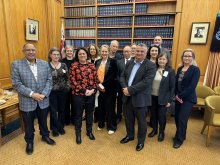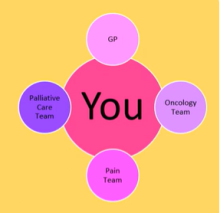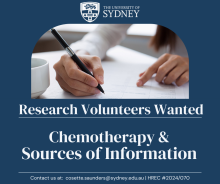Latest News

If you have had axillary (armpit) lymph nodes removed during breast surgery, you may have been told that you should avoid any medical procedures involving needles on the affected arm. This traditional advice was based on the idea that using needles on this arm might increase the risk of lymphoedema. However, the Australian and New Zealand College of Anaesthetists have recently changed that recommendation, saying that clinical evidence shows that this is not the case and that the arm of the affected side can usually be safely used for medical procedures. In fact, they say, using the arm on the affected side can be better for patient safety and comfort.

It’s wonderful news for those with HER2 positive (HER2+) advanced breast cancer (ABC) that Pharmac proposes to fund Enhertu (trastuzumab deruxtecan, T-DXd), a breakthrough HER2-targeted medicine, from 1st January 2025.
Enhertu has been shown to keep HER2+ ABC disease stable four times longer than current treatments, and results in a longer survival time. This time is precious for New Zealand women with breast cancer and we’re delighted to see that Enhertu will be funded.

One of the biggest challenges in any diagnosis, and treatment journey, is finding positivity during very worrying and difficult times.
It’s easy to be afraid and get stuck in a negative spiral. Being positive and thinking positively can help you cope with cancer, but it is natural to also feel upset and frightened sometimes. People with cancer are often encouraged to be positive. But it’s not always easy. It’s important to acknowledge there will be some very difficult days and allow ourselves to feel and express emotion.
If positivity doesn't feel right for you, or doesn't feel right in a specific situation, or on any given day, that's okay. Acknowledge how you’re feeling, allow it to be, and then think about some actions you might take to feel differently.

BCAC recently joined over twenty groups representing New Zealanders with a wide range of diseases to visit Wellington under the Patient Voice Aotearoa (PVA) banner. We met Hon. Dr Ayesha Verrall, Labour’s health spokesperson and former Health Minister, and visited Pharmac to hear Hon. David Seymour, Associate Health Minister (Pharmac) present his Letter of Expectation to Hon. Paula Bennett, Pharmac’s recently appointed Board Chair.

Good news for New Zealanders with advanced triple negative breast cancer. From 1st October 2024 Pharmac will fund Keytruda (pembrolizumab) for those with recurrent or metastatic triple negative breast cancer. Around 15% of all breast cancers, and 16% of metastatic breast cancers, are classified as triple negative. This type of breast cancer does not respond to medicines that target HER2 or oestrogen receptors and until now only chemotherapy was available for these patients in our public system. Keytruda is an immunotherapy that is expected to improve progression-free survival, overall survival and quality of life for people with triple negative breast cancer who have a PD-L1 Combined Positive Score ≥10.

Difficulty concentrating or forgetfulness experienced by some people during and after breast cancer treatment is known as brain fog or chemo brain. Researchers at Auckland University want to understand whether there are changes in the brain caused by cancer or its treatment. Better understanding will lead to improved management of this condition in future patients.
The study will involve MRI brain scans in newly diagnosed patients before surgery and after first chemotherapy. Healthy volunteers are also needed for comparative scans. Participants will need to fill out three questionnaires.

This webinar is a comprehensive, in-depth presentation by NZ medical experts that answers questions about pain and its management from NZ women with advanced breast cancer.
‘We recommend this for anyone with questions about pain and pain management. It provides a lot of valuable information about pain in general and pain associated with breast cancer and its treatment.’ says BCAC Chair Libby Burgess.
The idea for the webinar came from women with advanced breast cancer belonging to Metavivors NZ and Sweet Louise. Their experiences with pain had varied widely and left them wanting to know more about the causes of pain during breast cancer and what can be done about it.

Dear Prime Minister Christopher Luxon, Minister of Finance Nicola Willis, and Associate Minister of Health (Pharmac) David Seymour.
In August last year a promise was made to fund 13 new cancer medicines via a $280 million ring-fenced fund to Pharmac. According to the National election manifesto, that fund was to start on July 1 this year by reinstating the $5 prescription fee. As you stated Prime Minister, those 13 medicines are "for lung, bowel, kidney, melanoma, and head and neck cancers that provide significant clinical benefits and are funded in Australia but not in New Zealand. Under National, New Zealanders will not have to leave the country, mortgage their home, or start a Givealittle page to fund potentially lifesaving and life-extending treatments that are proven…

Have you undergone chemotherapy for cancer for the first time in the last twelve months? Researchers from The University of Sydney are interested in your experience. Participants over 18 are wanted to complete a 20-25 minute online survey.
The researchers are investigating how the different sources of information people encounter before undergoing chemotherapy can influence expectation and subsequent experience of side-effects arising from chemotherapy. During this study you will be asked about the sources of information you used to understand your treatment (e.g., doctors, family, social media) as well as what side-effects you expected and experienced as a result of chemotherapy.
Breast cancer organisations turned out in force at Valuing Life, a Parliamentary Medicines Access Summit. We all did our best to make the case for broader, faster access to modern medicines to improve the lives of breast cancer patients.



